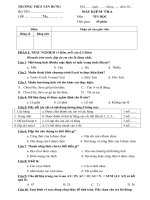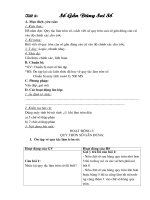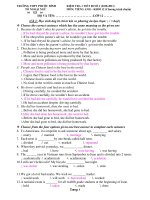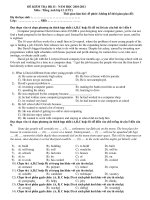KIỂM TRA 1 TIẾT BI SỐ 2 (2010-2011) MÔN: TIẾNG ANH – KHỐI 12 ppsx
Bạn đang xem bản rút gọn của tài liệu. Xem và tải ngay bản đầy đủ của tài liệu tại đây (113.54 KB, 4 trang )
Trang 1
TRƯỜNG THPT PHƯỚC BÌNH KIỂM TRA 1 TIẾT BI SỐ 2 (2010-2011)
TỔ NGOẠI NGỮ MÔN: TIẾNG ANH – KHỐI 12 (Chương trình chuẩn)
HỌ VÀ TÊN: . . . . . . . . . . . . . . . . . . . . . . . . . LỚP 12 . . . . . .
(Ch ý: Học sinh dng bt chì tơ kín vo phương án lựa chọn: ; / < hay\)
Choose the correct sentence which has the same meaning as the given one
1. Because he didn’t obey his parent’s advise, he got into the trouble.
;. If he had obeyed his parent’s advise, he wouldn’t have got into the trouble
/. If he obeyed his parent’s advise, he wouldn’t got into the trouble
<. If he had obeyed his parent’s advise, he would have got into the trouble
\. If he didn’t obey his parent’s advise, he wouldn’t got into the trouble
2. That factory is producing more and more pollution.
;. Pollution is being produced more and more by that factory.
/. More and more pollution is produced by that factory.
<. More and more pollution are being produced by that factory
\. More and more pollution is being produced by that factory
3. People say Chinese food is the best in the world.
;. Chinese food is said to be the best in the world.
/. I agree that Chinese food is the best in the world.
<. Chinese food is eaten all over the world.
\. No food in the world is eaten as much as Chinese food.
4. He drove carelessly and had an accident.
;. Driving carefully, he avoided the accident.
/. If he drove carefully, he wouldn’t have an accident.
<. If he had driven carefully, he would have avoided the accident.
\. He had an accident despite driving carefully.
5. She did her homework, then she went to bed.
; .Before she did her homework, she had gone to bed.
/.After she had done her homework, she went to bed.
<.Before she had gone to bed, she did her homework.
\.After she had gone to bed, she did her homework.
Choose from the four options given one best answer to complete each sentence
6. To Americans, it is impolite to ask someone about age, _________ and salary.
;. marry /. married <. marriage \. marrying
7. Each term is __________by one-break called half term.
;. divided /. cut <. marked \. separated
8. When they arrived yesterday, we____________ dinner.
;. had /. have <. were having \. was having
9. The ______ year in Vietnam runs from September to June and is divided into 2 terms.
;. academically /. academicals <. academician \. academic
10. I still can’t believed it! My bicycle ___________ last night.
;. was stolen /. was stealing <. stolen \. stole
11. We got a lot of bad marks. We wish we ________ harder.
;. would work /. will work <. had worked \. worked
12. A national exam is _______ for all twelfth grade students at the beginning of June.
;. held /. taken <. made \. done
Trang 2
13. He went to the cinema after he ____________his homework.
;. finishes /. finished <. had finished \. has finished
14. Mr. John, __________is standing over there, can speak 4 languages.
;. who /. whom <. that \. whose
15. _________she was very tired, she helped her mother with the housework.
;. In spite of /. Despite <. So \. Although
16. It is very kind __________your sister to give me a lift to the airport.
;. from /. with <. for \. of
17. Most smokers agree that it is very difficult to_________ smoking.
;. go on /. give up <. put on \. give out
18. Schooling is _________ for all English children from the age of 5 to 16.
;. necessary /. essential <. compulsory \. voluntary
19. He is thought ________ to America last year.
;. to be /. to have been <. being \. was
20. I have just visited the church_____________ in the 18
th
century.
;. was built /. built <. building \. which built
21. He won’t pass the exams _________he learns harder.
;. if /. when <. unless \. because
22. “Let’s go to the movie now” “ Oh!_____________”
;. I don’t /. I need it <. Why’s that \. It’s a good idea
23. Nam: “ Whose book is this?” Mai: “ ___________”
;. No, It’s over there /. It’s my mother’s <. It’s just outside \. It’s my mother
24. It is of great importance to create a good impression _______ your interviewer.
;. with /. about <. for \. on
25. The novel was so exciting that I couldn't __________ .
;. let it down /. look it up <. pick it up \. put it down
26. ________I moved in my new apartment, my neighbors have come to my house twice.
;. Because /. Since <. When \. After
27. The man ______ over there is my teacher.
;. stands /. to stand <. standing \. stood
28. This is the best play _________I have ever seen.
;. which /. what <. whom \. that
29. Can you turn off _______ light before leaving this room?
;. the /. a <. an \. ( no article)
30. “ Hello! My name is Nam. Nice to meet you” “ Hello__________”
;. I’m fine /. Really?
<. Good! \. I’m Mai. Glad to meet you
Identify the one underlined word or phrase that must be changed in order to make
the sentence correct
31. Since I have moved my house, they haven’t written to me.
; / < \
32. I finish my work before Mary came here to see me.
; / < \
33. Can motorbikes produce in Vietnam?
; / < \
Trang 3
34. Unless you didn’t give her flowers on the birthday, she would be sad.
; / < \
35. There are also many single fathers which are raising children by themselves.
; / < \
Choose one word whose underlined part is pronounced differently.
36. ;. looked /. washed <. turned \. missed
37. ;. dead /. meat <. please \. heat
38. ;. games /. plays <. arrives \. stops
Read the text and choose the best word to fill in the blank.
Children in the Netherlands must be at least four years old to (39) _____ primary
education. Almost all 4-year-olds (99.3%) in the country indeed attend primary school,
although this is not compulsory until children reach the age (40) _____ 5. Primary school
is free of charge. In most schools, children are grouped by age in mixed ability classes,
with one teacher for all subjects. Primary school consists of 8 groups, thus schooling (41)
_____ for 8 years. During the first two years, which is also called kindergarten, children
receive an average of 22 hours of (42)_____, during the last 6 years children receive an
average of 25 hours per week. Schools are open 5 days a week, but children are free on
Wednesday afternoon. At the end of primary school, or in group 8, schools advice on
secondary school choice. Most schools use a national test to support this advice, for
instance the 'Citotoets’, a test (43)______ by the Central Institute for Test development.
39. ;. enter /. afford <. come \. run
40. ;. on /. of <. in \. for
41. ;. spends /. takes <. lengthens \. lasts
42. ;. educate /. education <. educator \. educative
43. ;. developed /. to develop <. develop \. developing
Choose one word whose stress pattern is pronounced differently
44. ;. father /. football <. begin \. question
45. ;. completion /. general <. prevent \. diversity
Read the passage carefully and then choose the correct answers
Preparation is a key to a successful interview. Does the idea of going to a job
interview make you feel a little nervous? Many people find that it is the hardest part of
the employing process. But it is not really true. The more you prepare and practice, the
more comfortable you will feel. You should find out as much as possible about the
company before you go to the interview. Understand the products that they produce and
the services that they provide. It is also good to know who the customers are and who the
major competitors are. Practice makes perfect. It will also make you feel more confident
and relaxed. So, practice your answers to common questions. Make a list of questions to
ask, too. Almost all interviewers will ask if you have questions. This is a great
opportunity for you to show your keenness, enthusiasm, and knowledge.
Make a great impression. The interview is your chance to show that you are the best
person for the job. Your application or resume has already exhibited that you are
qualified. Now it is up to you to show how your skills and experience match this position
and this company. The employer will be looking and listening to determine if you are a
good fit. He/she will be looking for a number of different qualities, in addition to the
skills that you possess. To make the best impression, dress appropriately; express your
strengths; arrive early, by about 10-15 minutes; be enthusiastic; shake hands firmly; be an
active listener; sit up straight and maintain eye contact; and ask questions
Trang 4
After the interview, follow up with a thank-you note. This is a chance for you to
restate your interest and how you can benefit the company. Your best bet is to try to time
it so that the note gets there before the hiring: decision is made. You should also follow
up with a phone call if you do not hear back from the employer within the specified time.
46. Which should not be shown during your interview?
;. Punctuality /. A firm hand shaking
<. Being properly-dressed \. Weaknesses
47. What does the writer advise you to practice?
;. Asking and answering questions related to the job.
/. Making products that the company produces.
<. Providing services that the company serves.
\.Meeting some customers and competitors.
48. Which is not included in the writer's advice?
;. You should not communicate with the interviewer after the interview.
/. You 'should make the best impression in the interview.
<. You should write a note to say thanks to the interviewer after the interview,
\. You should telephone the interviewer for any information after the interview.
49. The pronoun it refers to ________.
;. the job /. the interview
<. the interviewer \. the preparation
50. You can show your qualifications in the
;. dressing style and punctuality /. competing with the competitors
<. resume and letter of application \. eye contact with the interview
“Chc cc bạn làm bài đạt kết quả tốt nhất!”









